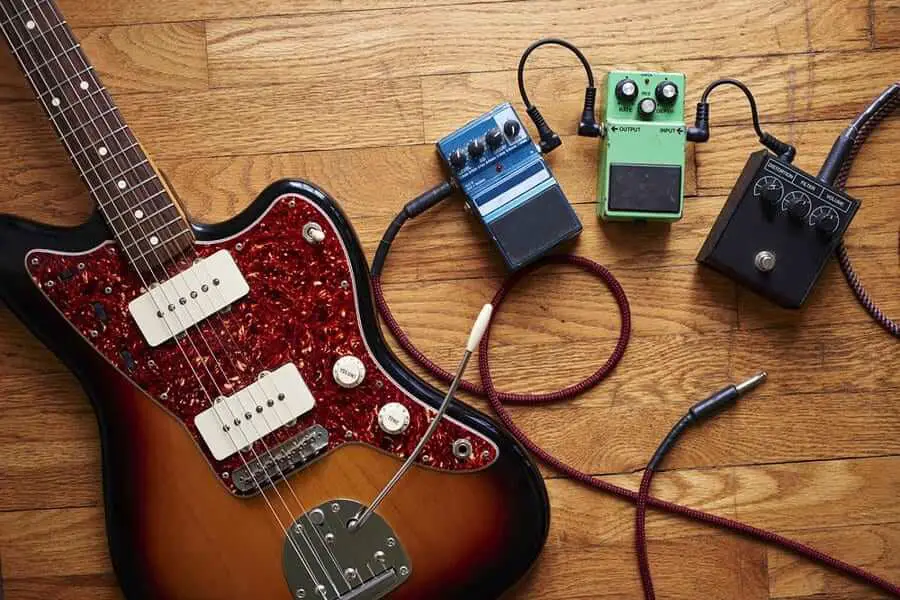









In this article, we’re going to be discussing the 8 best fuzz pedals for bass guitar, that exist in 2020.
However, before we jump straight into this, we’re going to briefly touch on what exactly a fuzz pedal is, and how it differs from other bass guitar processors.
Well, let’s get to it!
What is a Bass Fuzz Pedal?
A Bass Fuzz Pedal is a bass effects unit, similar to a bass distortion pedal or bass overdrive pedal, which modifies a signal to produce a ‘fuzzy’, ‘buzzy’ and slightly ‘distorted’ sound.
This sound was originally made popular in the 1960s/70’s and was originally created by turning up a tube-amplifiers gain knob, to overdrive its internal preamp.
Although fuzz can also be found in some bass multi effect pedals, it’s generally of higher quality in a singular effects unit.
Overdriving a bass signal in order to achieve this effect greatly changes the waveform of the original signal, adapting the audible timbre, taking away some low-end, adding sustain and high-end harmonics.
Therefore it’s important that proper EQ is done, to help the bass signal remain bass-like.
Fuzz pedals for bass guitar are generally used in blues, rock and indie music, where the common characteristic of both guitar and bass is to produce a slightly distorted sound.
For more information on Bass Fuzz, take a look at Wiki.
Bass Fuzz Units are commonly used within both a live performance and studio recording environment.
As we’ve briefly talked about, it’s important to note that because of the way in which a bass fuzz pedal processes the dry bass signal, and manipulates the waveform, it’s best to place this strategically within your pedal board’s signal chain, using it in a position where the noise floor of the input signal is low, and other pedals down the signal path are not likely to accentuate the processed signal further.
As always, we’ve listed the products below in price order, from least expensive (at the top) to the most expensive (at the bottom). Alongside this, we’ve commented on each product’s features and technical specifications, so that you can make the best decision as to which unit suits your specific needs.
Well, without further ado, let’s discuss what the best bass fuzz pedals are in 2020!
Best Bass Fuzz Pedals
- Valeton Lazaro Modern Fuzz Effect Pedal
- Hartke HF44 Bass Fuzz Effects Pedal
- Mooer MFZ4 Fog Bass Fuzz Effects Pedal
- MXR M84 Bass Fuzz Deluxe
- EarthQuaker Devices Erupter Ultimate Fuzz Tone Effects Pedal
- EarthQuaker Devices Hoof V2 Fuzz
- MXR M287 Sub Octave Bass Fuzz Effects Pedal
- Darkglass Duality Fuzz Bass Fuzz Pedal
Valeton Guitar Distortion Effect Pedal
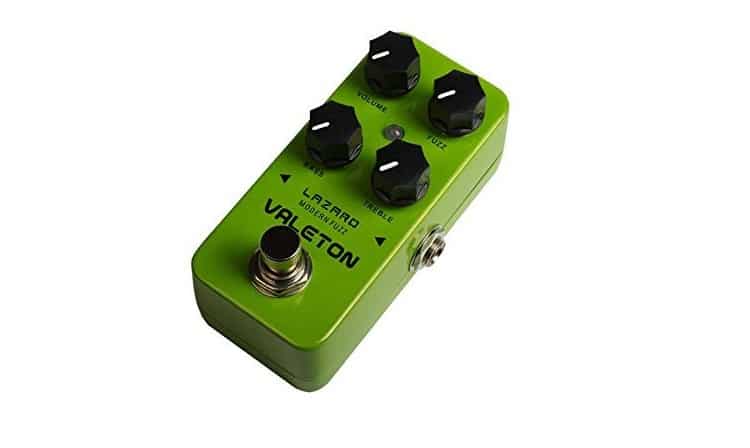
Features
- All-Analog fuzz pedal for Bass/Guitar
- Compact in size, metal casing
- True bypass
- LED for visual confirmation that the Processor’s engaged
- A number of interface controls
- Volume: Adjusts the output dB
- Fuzz: Adjust the level (intensity) of fuzz effect
- Bass: Adjusts the tonality of the fuzz
- Treble: Adjust the high-end frequencies
- Runs on a 9V battery, but can also be directly run on a 9v power supply (not included)
Technical Specifications
- 1/4″ jack input
- 1/4″ jack output
- 9v battery (included): 9v AC adaptor is sold separately (9V Power Supply – Buy on Amazon)
- Weight : 0.78lbs
- Dimensions : 5.5″ x 2.6″ x 4.4″ inches
Summary
The Lazaro Modern Fuzz pedal by Valeton is one of the less expensive pedals we’ve featured in this article, as we like to accommodate for all budgets.
It’s a nice sized unit, portable and can be used on both bass and guitar. We’d only recommend this unit if you want an inexpensive fuzz pedal that can deliver mild fuzz. If you’re planning on using this for maximum fuzz, please be aware that the noise floor isn’t so forgiving.
None-the-less, a decent choice for those on a budget. We would however prefer Mooer MFZ4 at this similar price range.
For a demonstration of the processor, take a look at the video demonstration below:
Hartke HF44 Bass Fuzz Effects Pedal
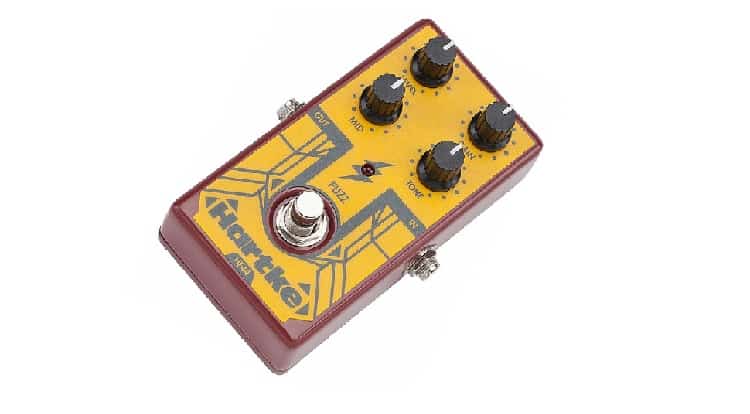
Features
- All-Analog Fuzz Pedal
- Engineering by Hartke
- Solid-built die-cast metal chassis
- Bright LED for visual confirmation that the Processor’s engaged
- A number of interface controls
- Level: Adjust the level (intensity) of fuzz effect
- Gain: Adjusts the level of distortion/sustain
- Mid: Adjusts mid-frequency response
- Tone: Adjusts the tonality of the fuzz
- Runs on a 9V battery, but can also be directly run on a 9v power supply (not included)
- Link to Owners Manual – Hartke HF44 Owners Manual
Technical Specifications
- 1/4″ jack input
- 1/4″ jack output
- 9v battery (included): 9v AC adaptor is sold separately (9V Power Supply – Buy on Amazon)
- Weight : 0.78lbs
- Dimensions : 5.5″ x 2.6″ x 4.4″ inches
Summary
The HF44 Bass Fuzz Pedal by Hartke is an all-analog processor that has 4 knob controls, combining both Fuzz, Sustain and slight distortion.
The unit is generally quite inexpensive, being one of the cheaper bass fuzz pedals that we’ve featured in this article.
Our opinion is that this fuzz pedal is ideal for the bassist who’s looking for a cheap pedal to play live shows with, and therefore doesn’t care if it gets thrown around a little. We would also say that it sounds good on lower-gain settings, with it sounding a little too fuzzy when you increase the rotary gain knob past 6/10 of the way.
However, why take our opinion, take a listen for yourself!
For a demonstration of the processor, take a look at the video demonstration below:
Mooer MFZ4 Fog Bass Fuzz Effects Pedal
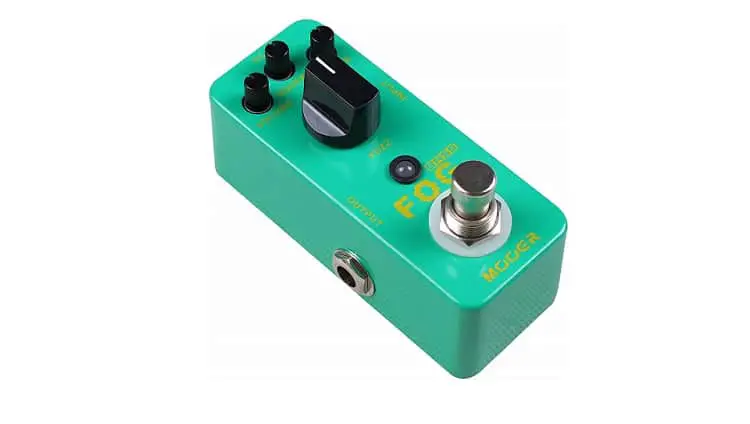
Features
- Very unique sounding Fuzz Pedal
- Boutique-looking/sounding
- Engineering by Mooer
- Compact design, ideal for pedal boards
- Bright LED for visual confirmation that the Processor’s engaged
- A number of interface controls
- Volume: Adjusts the output dB
- Squeeze: Adjusts the pulse waveform from wide to narrow
- Tone: Adjusts the tonality of the fuzz
- Fuzz: Adjusts the intensity of Fuzz effect
- Runs on a 9V battery, but can also be directly run on a 9v power supply (not included)
- Link to Owners Manual
Technical Specifications
- 1/4″ jack input
- 1/4″ jack output
- 9v battery (included): 9v AC adaptor is sold separately (9V Power Supply – Buy on Amazon)
- Weight : 0.35lbs
- Dimensions : 3.7″ x 1.6″ x 2.0″ inches
Summary
The MFZ4 developed by Mooer is their boutique-style fuzz pedal.
This unique sounding pedal is perfect for the bassist who isn’t looking for anything mainstream, but rather a tone that will turn heads (in a good way), with fellow bassists asking “how did you get that awesome tone”.
At around $50, and considering the size of this unit, it’s a steal!
For a demonstration of the processor, take a look at the video demonstration below:
MXR M84 Bass Fuzz Deluxe
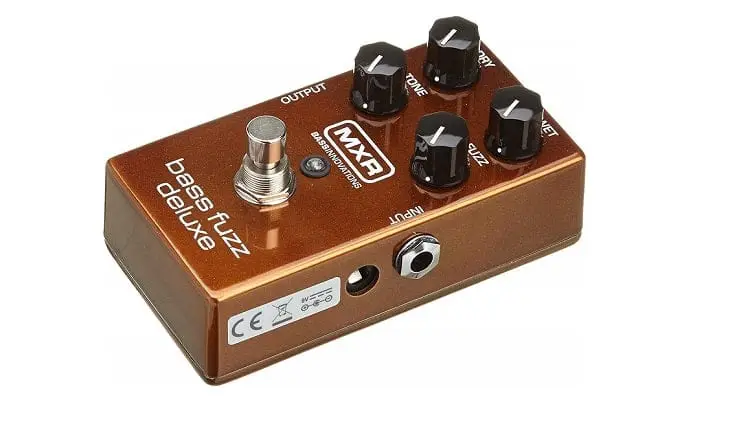
Features
- Fuzz pedal built specifically for Bass
- Engineering by MXR Electronics, Jim Dunlop
- Integrates modified vintage fuzz circuitry
- Bright LED for visual confirmation that the Processor’s engaged
- A number of interface controls
- Dry: Adjusts the amount of Dry (original) Signal
- Wet: Adjusts the amount of Wet (fuzz) Signal
- Tone: Adjusts the tonality of the fuzz
- Fuzz: Adjust the level (intensity) of fuzz effect
- Runs on a 9V battery, but can also be directly run on a 9v power supply (not included)
- Link to Owners Manual
Technical Specifications
- 1/4″ jack input
- 1/4″ jack output
- 9v battery (included): 9v AC adaptor is sold separately (9V Power Supply – Buy on Amazon)
- Weight : 0.78lbs
- Dimensions : 5.5″ x 2.6″ x 4.4″ inches
Summary
The MXR M84 bass fuzz pedal by Jim Dunlop is certainly a small pedal that packs a punch! Its metal chassis is small enough to fit onto your pedal board without reserving much space, which means that it’s very useful for the gigging musician who wants a well-designed and rugged pedal.
As with most MXR units, when it comes down to overall sound quality, the M84 really does provide a high-quality fuzz effect, and you can hear this from the video demonstration below. This is because of the modified vintage fuzz circuitry that MXR use in these little units, giving them that warm sound.
Alongside the high-quality internal components, it features a range of user interface controls including wet & dry signal controls, fuzz intensity and tonality, alongside LED/Silicon diode engagement.
We’re confident in saying that you’ll be happy with the fuzz sound quality that this pedal provides, I mean just take a look at the reviews (Amazon Reviews of MXR M84). Whether or not you need this device for live performances or studio recording, it’s got your back!
Overall, a fantastic bass fuzz pedal.
If we had any criticism of this interface (if we’re being ultra picky), it’s the fact that you cannot save presets like you can with a digital distortion pedal; However, you are unlikely to be able to get this kind of sound quality with a digital pedal.
For a demonstration of the processor, take a look at the video demonstration below:
EarthQuaker Devices Erupter Ultimate Fuzz Tone Effects Pedal
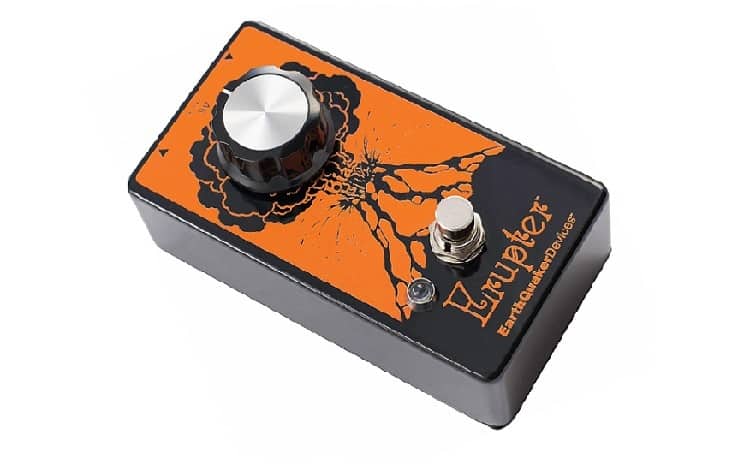
Features
- Classic sounding Fuzz unit
- Engineering by EarthQuaker Devices
- Bright LED for visual confirmation that the Processor’s engaged
- Single-knob interface for easy adjustment
- Bias: controls fuzz intensity and character tonality
- Runs on a 9V battery, but can also be directly run on a 9v power supply (not included)
- Link to Owners Manual
Technical Specifications
- 1/4″ jack input
- 1/4″ jack output
- 9v battery (included): 9v AC adaptor is sold separately (9V Power Supply – Buy on Amazon)
- Weight : 0.88lbs
- Dimensions : 5.5″ x 2.6″ x 4.4″ inches
Summary
The Erupter fuzz tone pedal by EarthQuaker Devices is one of their fuzz pedals that is great for an awesome sounding ‘plug-n-play’ experience. Taking the company two years worth of tone development, this thing really delivers a nice warm fuzz.
The simple to use interface comes as a result of the high-quality internal circuitry, and the fact that it’s been designed to sound good with any pickup type, and in any location within the signal chain. Now you’ll have to test this yourself, but coming from the brand itself, this is a bold statement to make, and they have 100% confidence in this little fuzz bass unit.
For a demonstration of the processor, take a look at the video demonstration below:
EarthQuaker Devices Hoof V2 Fuzz
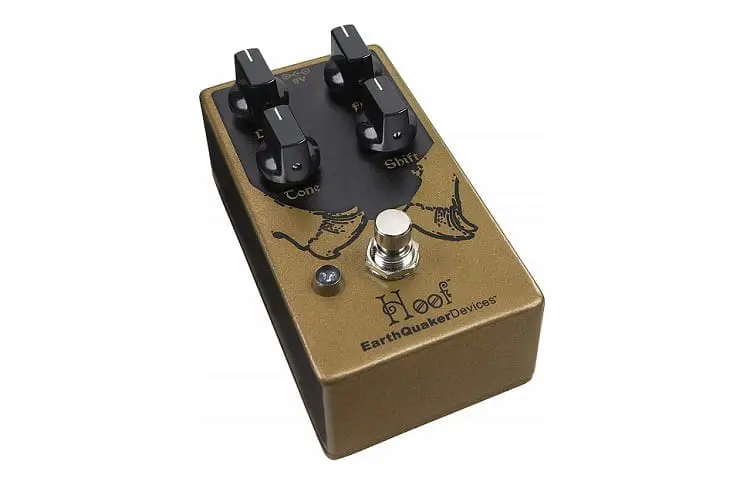
Features
- Fuzz pedal built primarily for Bass
- Engineering by EarthQuaker Devices
- Loosely based on classic green Russian muff/fuzz circuitry
- Bright LED for visual confirmation that the Processor’s engaged
- Features a hybrid of Germanium/Silicon internal design for temperature stability and better tonality
- Handmade all-analogue circuitry
- A number of interface controls
- Level: Adjusts the amount of Dry (original) Signal
- Fuzz: Adjust the level (intensity) of fuzz effect
- Tone: Adjusts the tonality of the fuzz
- Shift: Works with Tone knob to adjust overall frequency response
- Runs on a 9V battery, but can also be directly run on a 9v power supply (not included)
- True Bypass Configuration
- Link to Owners Manual
Technical Specifications
- 1/4″ jack input
- 1/4″ jack output
- 9v battery (included): 9v AC adaptor is sold separately (9V Power Supply – Buy on Amazon)
- Weight : 0.78lbs
- Dimensions : 4.75″ x 2.5″ x 2.25″ inches
Summary
The Hoof V2 Fuzz pedal by EarthQuaker is their all-analogue germanium/silicon hybrid circuitry processor. This handmade pedal is loosely based on the classic green Russian fuzz circuit and is Hoofs flagship fuzz pedal.
It provides a wide range of tonal controls, from full-blown fuzz to a crispy overdriven fuzz, making it a versatile sounding fuzz pedal for your bass.
For a demonstration of the processor, take a look at the video demonstration below:
MXR M287 Sub Octave Bass Fuzz Effects Pedal
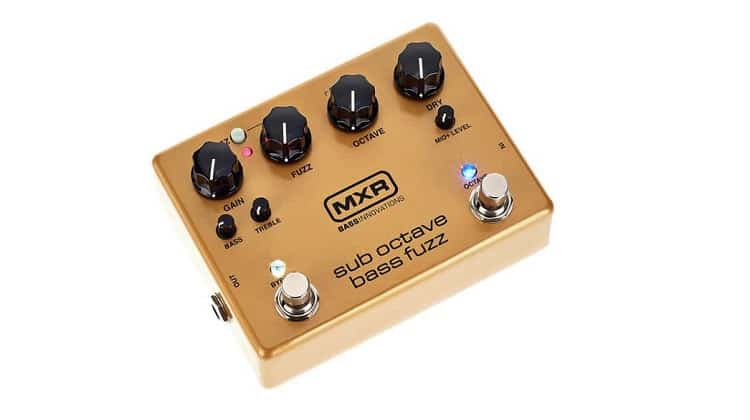
Features
- Fuzz pedal built specifically for Bass
- Engineering by MXR Electronics, Jim Dunlop
- Integrates modified vintage fuzz circuitry
- Bright LED for visual confirmation that the Processor’s engaged
- A number of interface controls
- Gain: Adjust the intensity of fuzz signal
- Fuzz: Adjust the volume of fuzz signal
- Sub Octave: Adjusts the volume of sub-octave signal
- Dry: Adjust the level of dry (unaffected) signal
- Bass: Controls low-end boost/cut
- Treble:Controls high-end boost/cut
- Mid+ Level: Controls mid-range boost/cut
- Runs on a 9V battery, but can also be directly run on a 9v power supply (not included)
- Link to Owners Manual
Technical Specifications
- 1/4″ jack input
- 1/4″ jack output
- 9v battery (included): 9v AC adaptor is sold separately (9V Power Supply – Buy on Amazon)
- Weight : 0.78lbs
- Dimensions : 5.5″ x 2.6″ x 4.4″ inches
Summary
The Sub Octave Bass Fuzz processor combines two great sounding fuzz effects with a deep growling sub-octave signal.
How did this pedal come to be exactly? Well the engineers at MXR combined their unique fuzz circuitry with the growl section of their Bass Octave Deluxe pedal.
With three separate output controls for Sub Octave, Fuzz and Dry signal, it really provides a good amount of versatility for you to be creative and find the sound that fits your needs.
Additionally, the range of EQ options really helps to tweak your output sound.
For a demonstration of the processor, take a look at the video demonstration below:
Darkglass Duality Fuzz Bass Fuzz Pedal
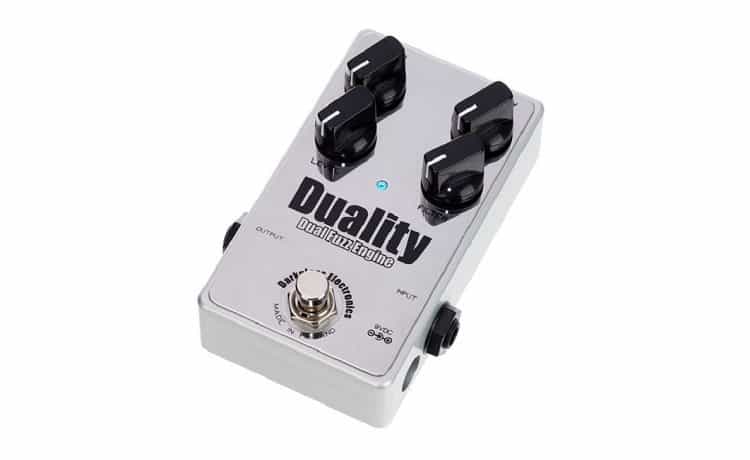
Features
- Fuzz pedal built specifically for Bass
- Engineering by Darkglass Electronics
- Integrates two distinctive circuits for varied tonality
- Squashy synth fuzz
- Pure chainsaw fuzz
- Bright LED for visual confirmation that the Processor’s engaged
- A number of interface controls
- Blend: Mixes clean signal and effect signal
- Duality: Blends both fuzz circuits
- Level: Adjusts the level of fuzz overdrive
- Filter: Adjust the level of high frequency in fuzz
- Runs on a 9V battery, but can also be directly run on a 9v power supply (not included)
- Link to Owners Manual
Technical Specifications
- 1/4″ jack input
- 1/4″ jack output
- 9v battery (included): 9v AC adaptor is sold separately (9V Power Supply – Buy on Amazon)
- Weight : 0.55lbs
- Dimensions : 4.4″ x 2.9″ x 1.8″ inches
Summary
The Duality fuzz pedal by Darkglass combines two fuzz circuits to give you the ability to have a synth-like fuzz, chainsaw fuzz, or a blend of both.
This pedal just sounds awesome, and you really can customise the sound with the range of interface options, with blend, filtering and EQ available. You only have to listen to the pedal in action to hear the quality of this fuzz on bass.
We personally prefer this pedal when the blend setting isn’t too high, as the fuzz really can sound uncontrollable, however, make no mistake that this pedal is very versatile.
For a demonstration of the processor, take a look at the video demonstration below:
In Conclusion, what’s the best fuzz pedal for bass?
Ok, so similarly with all of our equipment reviews, instead of recommending one product for every reader, we like to segment our recommendations based on a number of factors, including technical features, sound quality, price, use-case and your budget.
Hence, we’ve laid out the recommendations below:
Premium sounding bass fuzz pedal which is highly portable – MXR M84 Bass Fuzz Deluxe
High budget and also after a sub-octave effect – MXR M287 Sub Octave Bass Fuzz Effects Pedal
Vintage-sounding, boutique-look distortion pedal – Mooer MFZ4 Fog Bass Distortion
Well, we hope that you’ve enjoyed reading our review of the best bass fuzz pedals, if you have any feedback or content requests then please contact us via our contact page.


